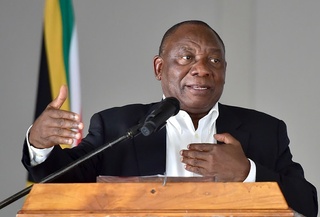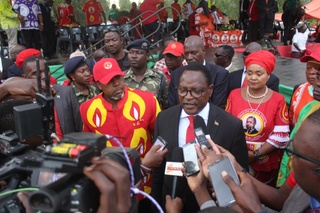News
It's time that Ramaphosa owned the wasted 26 years
The problem with the framing of the economic problem is that failures are blamed on events that occurred prior to 1994 and on those since the advent of Covid-19. The intervening 26 years during which the ANC has governed are out of the reckoning

Research Director, The Brenthurst Foundation

Director, The Brenthurst Foundation


President Cyril Ramaphosa was responding to a question by the Freedom Front's Pieter Groenewald about growing the economy in a virtual sitting of the National Assembly last week, when he said:
"Our people have been patient forever and a day… they have been waiting for solutions. I am saying let us work together... [find] real solutions that are going to be impactful on the livelihoods of our people. An inclusive economy is what should be occupying you, honourable Groenewald, in your mind and everything you do, rather than let us continue holding on to the privileges that white people have always had in this country."
On a shallow reading — and this is the age of shallow readings - this is a reasonable answer. Ramaphosa, leader of a liberation movement, is telling Groenewald, leader of a party of Afrikaner nationalism which was the reigning ideology of the apartheid era, it is time to stop “holding on to the privileges that white people have always had in this country.”
Ramaphosa went on to say: “We need to ensure that the black people, who were under apartheid rule, excluded from playing an important role in the economy of their own country, are given their rightful position in playing an important role in the economy. This is something that has to be done without any fail.”
This is South Africa's great self-evident truth. The country will not prosper unless it urgently addresses gaping inequality, over which the shadow of race still falls, and produces an economy that includes all.
But who is to blame for this lingering inequality?
The problem with this latest framing of the economic problem is that the state of the present is blamed on events that occurred prior to 1994 and on those since the advent of Covid-19. The intervening 26 years during which the ANC has governed as a super majority are left out of the reckoning as if they did not exist.
There has frequently been talk of the 'nine wasted years' of the Jacob Zuma presidency. No fewer than 13 Ministers from Zuma's cabinet are still in office under Ramaphosa and, unsurprisingly, with a few notable exceptions, they have continued to deliver failure.
Perhaps it is time to talk about the 26 wasted years under a succession of five post-apartheid governments.
During these 26 years, the ANC was not a spectator watching in horror as others shaped South Africa's destiny. It was the government. It appointed five consecutive ANC presidents who appointed all members of the Cabinet, all senior servants and set policy in all fields from foreign affairs to finance and policing.
ANC presidents appointed finance ministers and these finance ministers set all policy on state spending, revenue and borrowing.
They crafted 26 consecutive budgets, allocating trillions of Rands in spending and collecting trillions in taxes in today's money.
Parliaments dominated by ANC members examined, amended and passed these budgets and thousands of pieces of legislation shaping the society in which we live.
The reality is that the South African state is, a quarter of a century later, wholly a creation of the ANC, its leadership and its policies. The ANC needs to own the fact that if the state is failing the country, it is because its leaders have made poor decisions and have made bad policy during this time, the result of which has been an ineffective state.
What kind of state has been created over the last 26 years?
Perhaps the worst decision made by the ANC was that it would be better to have trusted political operators in positions of authority than those with the technical skills to drive action. While clothed in the language of transformation, this shift was, in reality, the large-scale dispensing of party patronage and by the end of the 1990s, a new problem had arisen: the slowing capacity of the state to deliver.
It is true, but unhelpful, to point out that such patronage had been dispensed by the old order to its loyalists. In any state where patronage rules — apartheid-era or post-apartheid- era - the civil servants serve the party and themselves and not the people with disastrous results.
While it might have been argued in the early 1990s that such political appointments were necessary because apartheid had failed to produce a diverse enough pool of skilled people to run the civil service, this was not true a decade later and certainly is not true now. It would be possible, if politics were put aside, to produce a substantially representative state consisting of people with the necessary skills. There are pockets within the state that are functional, but, in general, the state can now best be understood as a giant patronage machine. How else do you explain the continued desire to fund SAA with tens of billions of Rands even as the country enters a debt crisis?
The cadre-deployment decision destroyed merit and entrenched patronage.
It did achieve a dramatic growth in the middle classes in the first decade-and-a-half of democracy, but this came at a price. The ANC's leading theorist, Joel Netshitenzhe, has produced the most searing analysis of this, describing what he called “the sins of incumbency”.
“In the main, the position of the emergent middle and upper strata is tenuous and insecure. The consequence of this is that, unlike the middle strata in "mature" class societies, the raison d'être of these emergent strata is not so much pride in the professions, or engagement in discourse on the nation's vision, or the shaping of positive value systems for society. Rather, it is survival and climbing up the steep social ladder.”
This, ultimately, has a corrupting influence: “Within parties, intra-party patronage and corruption take root. The political centre is unable to correct the local mediators to mass constituencies and the foot-soldiers on whom it relies to garner votes. In pursuit of numbers, a price is attached to a Conference delegate's vote.”
The party, it seems, is no longer a liberation movement so much as a racket to protect the dispensing of state patronage.
This weakening of the state through patronage has been accompanied by a raft of poor if deliberate policy choices.
South African education is very well funded by developing world standards, but it produces very poor outcomes because it has suffered several major policy and administrative mistakes. Outcomes-based education was made policy against the advice of many who cautioned that the system was incapable of delivering it. When this act of hubris was finally abandoned, a generation of school children had suffered and public education entered a mire of mediocrity from which it is yet to emerge.
The decision to humour their trade union, SADTU, an ANC ally, has led to poor appointments and a decline in teacher performance. The ANC, although aware of this problem, appears unable to act lest it upset the patronage machine by alienating a key constituency that benefits from it.
When it comes to economic policy, South Africa has been through a full bowl of alphabet soup. We have had the RDP, GEAR, ASGISA, the NDP, and the NGP.
When a policy showed promise as GEAR did by straightening government's finances and laying the foundation for consecutive years of high growth above five percent and even a budget surplus in the mid-2000s, it was pilloried and its supporters were belittled and, in the case of its chief architects, the Finance Minister Trevor Manuel and President Thabo Mbeki, insulted as managers of the “class project”.
GEAR was thrown out and replaced with the rampant state spending of the Zuma era. Unsurprisingly, growth slumped, and investment declined as debt mounted and revenue began to dry up.
Just this week, government announced measures to support the sugar industry to save jobs. But it was government's policy decision to tax sugar for health reasons that led to the slump in demand.
Foreign policy is another area where poor choices and weak regional leadership has contributed to a mounting domestic crisis. Rather than pursuing, as Nelson Mandela had advocated, a human rights-based policy, the ANC has preferred one which demonstrates the bond between liberation movements whatever the cost to democracy or governance. The failure of Zimbabwe is a case in point, reinforcing traits of entitlement, impunity and extraction, and leading inevitably to a flood of Zimbabwean immigrants as that economy crumbled.

Perhaps the best illustration of poor policy is, however, at home in the shape of Eskom. Government, under President Mbeki, decided to open generation to the private sector and halted Eskom's power station build programme. Eventually, bowing to political pressure against “privatisation”, it changed tack, but by then South Africa had insufficient generation capacity and load shedding began in the late 2000s. It has recently decided to reverse course again as the utility has run out of money.
Another major policy mistake is about to be made. The Finance Minister, Tito Mboweni did not mince his words when presenting his extraordinary budget this week: “Our Herculean task is to close the mouth of the Hippopotamus! It is eating our children's inheritance. We need to stop it now! Our Herculean task is to stabilise debt.”
But Ramaphosa appears oblivious to this dire warning that we are about to pass the point of no return. Instead, he is doubling down on Zuma-era statism using the Covid-19 crisis as cover.
In his words: “Any post-war situation must be state-led. The state must set policies, give direction and the state is called upon to look at how the market is functioning and structured.” Absent is an examination of the state, how it is functioning and how it is structured.
Such a DDR-redux is a recipe for economic disaster and a lack of governance accountability.
In addition to increasing the role and, presumably, the size, of the state, a massive infrastructure roll-out is being planned which will further push borrowing into the red and imperil the country's finances.
Greater state intervention in the private sector, which is what Ramaphosa appears to be proposing, will further deter investment and weaken the economy.
Ramaphosa is making a choice which goes against the advice of all serious economic policy institutions - which will result in greater debt, shrinking the space for business and decreasing the likelihood that jobs will be created. He must own that decision when its consequences come home to roost.
The closest government has come to admitting fault was the view of the National Treasury, which in outlining the triple-whammy of negative growth, a burgeoning fiscal deficit and a debt-to-GDP ratio sailing through 80%, noted that “weaker short term activity comes after a decade of slow growth”. But the tone of this observation is that the decade of slow growth somehow materialised independently of government to be noted with bemusement by officials in white coats on clipboards. It was, in fact, the direct outcome of bad government choices and poor policy.
All of these administrative and policy choices over the last two-and-a-half decades were made exclusively by a succession of ANC governments in the face of loud warnings that they would result in fewer jobs and low growth. The party acted with its eyes wide open.
Summoning the ghost of apartheid to explain all our present ills represents a tacit admission that the last 26 years were of no consequence. Using Covid-19 as cover to ramp up state spending by making more bad policy choices will continue to have dire consequences. We are not helpless. Better policy choices will shape a more positive destiny, from foreign policy towards Zimbabwe to staring down the unions over the public sector wage bill.
But, instead, we have a populist response that amplifies popular enemies and blames them for failure.
In the words of Netshitenzhe: “Within society, there develops among rebel-rousers, a nationalism of convenient victimhood, where radical slogans are used to hide incompetence and greed. The logic in this instance is: because you were oppressed, you can mess up, steal and plunder; and shout racism when challenged.”
The problems did not end with apartheid and start again with Covid-19. The ANC must answer for its 26 years of rule. To own the future, we have to own the sins of the past.
Image of Cyril Ramaphosa by GCIS
This article was published by the Sunday Times

